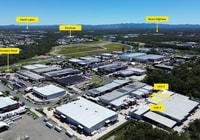
Pressure rising for private credit, Andrew Roberts warns
Former Rich Lister and real estate investor Andrew Roberts is predicting problems ahead in private credit, even as he increases his exposure to the booming sector.
The 59-year-old Roberts, who led his family’s exit from the Multiplex business in 2007 and left the construction sector a second – and promised final – time this year after selling one part of his eponymous business, Roberts Co, and closing another, now focuses on real estate lending.
He’s not the only one who sees opportunity in lending to construction and development businesses that often struggle to get bank credit. In June, New York-based Avenue Capital invested $450 million into Roberts’ private business for a half stake, replacing his former partner, Schroders Group.
But the sector was headed for a rocky time in which bad credit decisions could hurt lenders to riskier projects, Roberts said in an interview.
“We’re starting to see some pressures emerge. They will see some discernment between lenders that have been more prudent and those that haven’t,” he told The Australian Financial Review.
“It might be a time where we see some cracks emerge. That could have an impact on returns from some funds, some investors, and we’ve seen some of that has already emerged.”
A shakeout – and imposition of tighter standards around disclosure of fees and conflicts of interest – in private credit, which accounts for an estimated 17 per cent of Australia’s commercial real estate lending market, would hasten a maturing of the sector and likely benefit larger players such as Roberts’ renamed Corval Avenue, ASX-listed Qualitas and Balmain.
A report published earlier this month by corporate regulator ASIC laid bare its concerns about the fast-growing and largely opaque sector, which has boomed because construction and development businesses need credit and investors want high yields.
“Real estate credit will continue to see significant growth.”
Roberts’ company – previously known as Schroders RF – settled 275 first mortgage investments totalling more than $1 billion in the five years to June.
It manages a portfolio of between 40 and 60 loans of what Roberts, a low-profile person who rarely grants interviews, called “very uninteresting” projects.
The company’s website shows a handful of development and investment loans ranging from $2.8 million to $35.1 million.
“They tend to be small developments that you would, you would drive by without any particular notice,” he said. “No big high-rise towers, none of those things.”
But it was clearly interesting to Avenue Capital.
“They … are now applying significant capital to grow that business,” he said.
Roberts declined to say whether the emerging “cracks” he identified included loans to former KPMG partner Jon Adgemis, who declared himself bankrupt earlier this month after accumulating $1.8 billion in debts – mostly to private credit funds – while chasing his now-failed dream of building up a pub empire.
Private credit overall would increase in Australia, Roberts said.
“Real estate credit will continue to see significant growth,” he said. “We’ve seen the banks pull back from the extent and the degree of lending they’ve done, particularly for real estate developers.”
But the oldest son of Multiplex founder John Roberts, who led that business and the $1.1 billion sale of the family’s 26 per cent stake to Canada’s Brookfield in 2007, said he was not intending to return to construction after the collapse of his company’s Roberts Co Victorian business in March and the sale a month later of its profitable NSW arm to Dubai-based contractor Arada.
The loss of that business was part of the reason Roberts, who ranked 151st in the 2024 Financial Review Rich List with an estimated wealth of $999 million, fell out of the top 200 ranking this year.
“It is just a really difficult industry, and I don’t think that the returns available match the risks. It’s obviously taken a lot of personal anguish for me. The answer is definitely not,” he said.
“I’ve asked some people close to me to make sure that they certainly intervene if there’s ever any sign [of me returning]!” he said with a slight smile.
Brother Tim Roberts, a former Mineral Resources director who runs aviation business AVWest, remains on the list with a $1.78 billion valuation.
Even after the Reserve Bank of Australia cut the benchmark lending rate by a combined 75 basis points since January, construction businesses remain under pressure.
The latest ASIC insolvency figures show construction industry insolvency appointments at end-September were up 28 per cent year-on-year to 1153.
The long-time construction boss said the construction sector’s high level of failures was likely to continue.
“We’ve seen a large number of construction contractors collapse, both at the head contractor level and the trade contract level,” Roberts said.
“There’s perhaps a general sentiment that the worst is over in relation to that, because the post-Covid inflation spike is over and so on. That’s probably generally true. But I’m not confident that the level of insolvencies that we will continue to see will remain at an acceptable sort of healthy level”.
This was largely because of the weighting of risk that meant clients put an unequally burden of risk on to their contractors, he said.
“We could continue to see a high level of insolvencies or problems. The root cause still remains with the imbalance on the risk sharing. And, you know, unless that ultimately is addressed, then it will come home to roost.”











